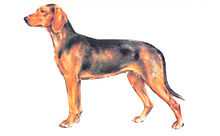Serbian Hound
 | |||||||
| Serbian Hound | |||||||
| Other names | Balkan Hound Srpski gonič Balkanski gonič | ||||||
|---|---|---|---|---|---|---|---|
| Country of origin | | ||||||
| |||||||
| |||||||
| Dog (Canis lupus familiaris) | |||||||
The Serbian Hound (Serbian: Српски гонич / Srpski gonič), previously known as the Balkan Hound (Балкански гонич / Balkanski gonič), is a pack hunting dog breed used in Serbia. It is red or tan with a black saddle, neck and cranium and red or tan face. Its head is flat and sloping, its muzzle pointed, with drop ears of the usual scent hound type. The Balkan Hound stands 17 to 21 inches (44–56 cm) in height and weighs about 44 pounds (20 kg). It is smooth-coated and coarse-haired. Described as pleasant natured and obedient, the breed is thought to descend from dogs left in the Balkan region by the Phoenicians in ancient times.[citation needed]
The FCI changed its official designation of this breed to the Serbian Hound in 1996.
The Serbian Hound is a very kind breed of dog, forming bonds with its family and owners. It is a lively breed and loves to walk and play with loved ones. The Serbian Hound is a very good worker with a tenacious nature that will not let it give up until it finds its quarry.
History
The Serbian Hound is one of a group of scent hounds that spread throughout the Balkans. The first record of the Balkan Hound comes from the 11th century where a man called Frank Laska described the breed in detail, along with other scenthounds of that time.
The Balkan Hound has been a permanent fixture in the Balkans throughout history with the first standard written for the breed in 1924; however, it was not until 1940 that the Fédération Cynologique Internationale accepted the standard which had been accepted elsewhere. The Balkan Hound was spread most widely through Serbia and, at a FCI meeting in 1996, it was decided to officially change the name to the Serbian Hound.
Today, the Serbian Hound can be seen throughout its native country, but remains very rare in other lands. Also called the black and tan.
Standard

Country of origin: Serbia
Height (at withers/shoulder): Males: 46–56 cm/18–22 in; Females: 44–54 cm/17½–21½ in
Weight: 44 lb/20 kg
Coat: Hair is short, abundant, gleaming and quite thick, lying well all over the body. The undercoat is quite well developed. Hair is slightly longer over the back of the thighs and the underside of the tail.
Colour: Red going from yellowy red to a rust tone, with a black mantle or saddle. The mantel or saddle goes as far as the head, which shows black marks on either side of the temples.
Markings: A round white mark no longer than 2 cm on the chest.
Lifespan: Average 12 years.
A robust, medium-sized dog. The skull is slightly rounded with a well-developed muzzle and a nose that is always black. The eyes are oval and slanting with dark irises. Ears are set high and of medium length and width; they are carried hanging down and close to the cheeks. The neck is strong and slightly arched. The body is slightly oblong, with a back that is well-muscled, long and powerful. The tail is slightly curved up and is carried below the line of the back, covered in abundant hair. Forequarters are powerful, well-muscled and parallel with muscular shoulder blades. The hindquarters are strong with well-muscled thighs.
Temperament
The Serbian Hound is a kindly breed with lively temperament which lends itself to both hunting in the field and life in the home. Tenacious, dependable, full of character and robust, this scenthound can make a good companion. Consistent and patient training required.
Friendliness: Friendly
Children: Can be good with children
Trainability: Intelligent, but can be difficult to train
Independence: Moderate
Dominance: Can be dominant if allowed to be
Decorum: May chase other pets
Combativeness: Can be good if sufficiently socialised with other dogs
Noise: Average barker
See also
- Hunting dog
- Hound
- Šarplaninac
- Scenthound Group
- Scent hound
- Serbian Tricolour Hound
- Montenegrin Mountain Hound
- Center for preservation of indigenous breeds
External links
- Serbian Hound (Revised July 1, 2009) at the United Kennel Club site
- Brief Documentary on Serbian Hound
| Wikimedia Commons has media related to Serbian Hound. |